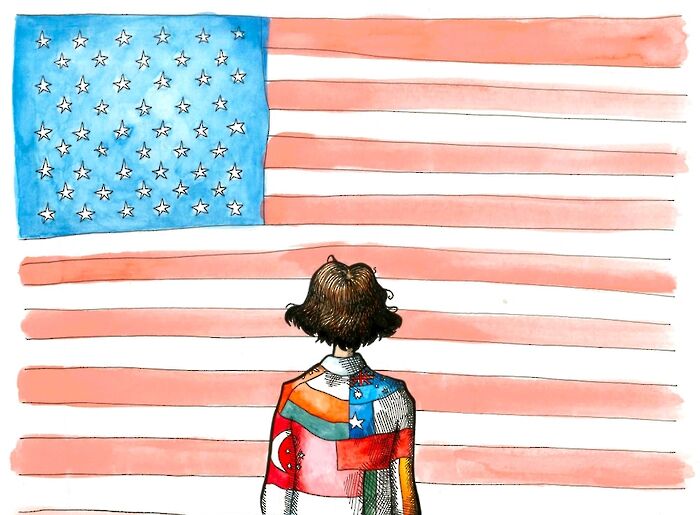Exploring freedom through clothing and culture
Features columnist Khadija Tahir discusses the relationship between clothing, self-expression and freedom, drawing on her experiences in Pakistan and the UK

Having just turned eighteen, I spent an afternoon at one of the markets in Lahore called ‘Liberty Market’. That day, I realised the irony of circumstances I was faced with.
‘Liberty Market’ presented a completely opposing environment to what its name entailed; it wasn’t a space of freedom or liberty at all. Rather, it was a place where women’s ‘liberty’ consisted only in their bargaining power and shopping bags. Being covered with my dupatta and ‘modestly dressed’, I tried my best to avoid the stares of men working in the bangle stalls. It was, and always had been, my own responsibility to protect myself from the judgemental, intrusive looks I’d received if I was in clothes that weren’t socially acceptable.
This led me to spiral into a state of self-pity, imprisoned in yards of cloth that made me feel as though my liberation was solely attached to what I wore. I felt as though once I’d be able to wear shorts, skirts and dresses, I’d be completely ‘free’ and ‘empowered’.
My medium of self-expression – or at least that’s what I labelled my clothes at the time – was being restricted not by the religious associations of the state, but by the distorted version of Islam being propagated by various fundamentalist groups.
“I felt as though once I’d be able to wear shorts, skirts and dresses, I’d be completely ‘free’ and ‘empowered’.”
This was confused by the fact that Pakistani society also idolised the West and Western culture. Hollywood, fair-skinned models, and even the English language dominated the country, constantly clashing with the ‘religious’ morals and views firmly held by those very citizens. Therefore, it was no surprise that my idea of freedom was confused by Western ideas of freedom, communicated to me through the remnants of colonialism and their monopoly over media, art, literature and education.
It was only by coming to Cambridge, a place where I was able to wear whatever I pleased, that I finally dissociated my self-expression from the length of my skirt. My ability to finally ‘express myself’ upon leaving Pakistan, surprisingly, did not allow me to escape from social restrictions. Being Pakistani and trying to be secure in my nationality meant that my means of expression were never going to be the same as most of my peers. I cared about things that had directly affected me or my country, which was different from the problems discussed in Cambridge, and thus, my self-expression, fuelled by my unique experiences, was also going to be different. Although I was finally able to wear my skirts and shorts without fear of judgement, my reservations came in other forms and from other places.
Having to restrict myself in many other ways, it became clear that my struggles took a different form. Being asked questions about terrorists caught in Pakistan encouraged me to dissociate myself from my country, and myself, even further. I feared scaring other people. With these many reservations and hesitations in mind, I began to filter what I’d say, trying not to voice my own isolation just to make sure I don’t exhaust the company of my new friends.
“I began to filter what I’d say, trying not to voice my own isolation”
Thus, the battle of self-expression continued, and it was only by constantly reminding myself of the rights and the freedom I deserve, that I had begun to feel comfortable in discussing my own personal experiences. Pakistan definitely has a long way to go in terms of female empowerment, independence and liberty, and is not the only country struggling to give its residents all that they desired. In England, I felt the same as I did in Pakistan: uncomfortable with who I am. Not being able to freely express my opinions, and forcing myself to ignore the micro-aggression and the isolation that comes with being a brown girl was an indication that the clothes on my body changed very little for me.
With time, courage and a reassurance that those who truly mattered would try understanding the difficulties of a Pakistani girl living in England, I began to confront the absence of freedom I felt abroad as well. It made me realise that societies were built upon commonalities and in turn, isolated those who weren’t able to conform. It took some reflection to realise that the shorts and skirts I had been waging my own personal war for wasn’t truly ‘freedom’ but merely a propagation of what freedom should be by the west, conveniently forgetting the social, religious and cultural differences of the many who had partitioned from their rule. With my blurry vision of western freedom having cleared up, it became clear that within each and every society, social conventions may always clash with what we believe is ‘our freedom’.
 News / CUP announces funding scheme for under-represented academics19 December 2025
News / CUP announces funding scheme for under-represented academics19 December 2025 News / SU reluctantly registers controversial women’s soc18 December 2025
News / SU reluctantly registers controversial women’s soc18 December 2025 News / Cambridge welcomes UK rejoining the Erasmus scheme20 December 2025
News / Cambridge welcomes UK rejoining the Erasmus scheme20 December 2025 Features / Should I stay or should I go? Cambridge students and alumni reflect on how their memories stay with them15 December 2025
Features / Should I stay or should I go? Cambridge students and alumni reflect on how their memories stay with them15 December 2025 Film & TV / Timothée Chalamet and the era-fication of film marketing21 December 2025
Film & TV / Timothée Chalamet and the era-fication of film marketing21 December 2025










